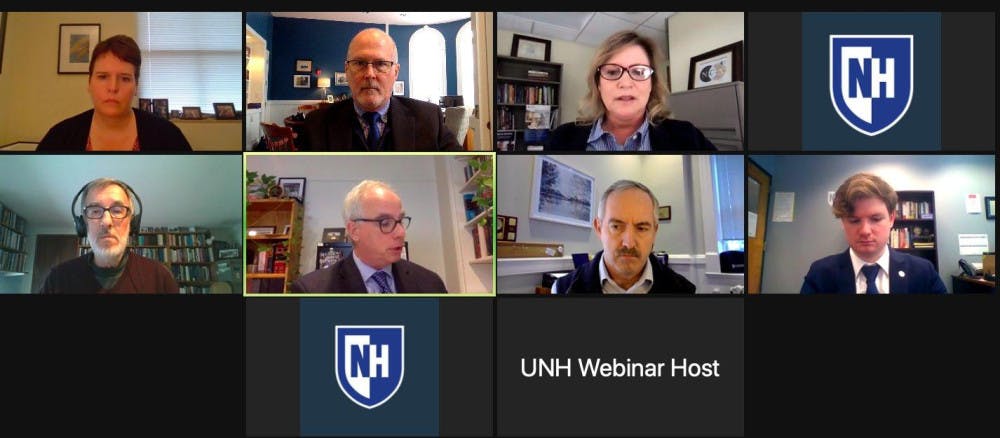On Friday, the University of New Hampshire (UNH), and Faculty Senate co-hosted a convocation on free speech, truth and civility. The hour-long zoom presentation and question and answer session were a part of UNH’s wider effort to bring attention to the issues of speech on college campuses and is the first of many similar convocations in the coming weeks.
The program opened with a brief statement by student body president Nicholas Fitzgerald highlighting the need for civility in the wake of the events of Jan. 6, where protests and a riot took place at the Capitol. President James Dean followed with a brief statement outlining the university’s efforts to promote greater diversity, inclusion, and equity, initiatives while still supporting the rights of free speech for students. Dean affirmed that UNH holds a high standard for protecting free speech (highlighting a high rating from the Foundation for Individual Rights in Education), but still retains many powers in restricting and organizing different kinds of speech.
The program began with a presentation by John Greabe, a professor and director at the UNH law school, on the constitutional realities and limitations of free speech on a publicly-funded college campus. Greabe highlighted that while as a public university, UNH cannot stifle free speech among its students, they still retain many ways to control speech. These include restricting the time and place for gatherings, such as having speakers on campus, as long as the university does not discriminate in which forms of speech they allow.
Greabe brings an important point that while UNH is not legally allowed to prevent one type of speech and not another, the university itself, along with its employees, are still allowed to use their own freedom of speech in their actions and events they hold. Because of this, the university is allowed to host events and speakers of their own choosing without consideration for allowing opposing viewpoints, so long as they do not restrict students or student orgs from hosting their own speakers in opposition. Greabe ended by quoting a section from the book “Free Speech on Campus,” which highlighted the different ways the university can and should take action. These included promoting diversity, inclusion, and equity training for staff members and students and promoting these values from the top down.
Greabe was followed by Jan Golinski, a UNH History Professor whose presentation focused on “Post-Truth and Anti-Science.” Golinski began by discussing the rise of misinformation in mainstream news and politics, particularly from former president Donald Trump. While Golinski acknowledged the danger of spreading misinformation about different topics, he warned that branding certain viewpoints, such as not believing in climate change, being against vaccines, and not believing in the severity of COVID-19, as anti-science is not accurate and is simplifying the issue at hand.
Golinski explained that while these positions are, in fact, contrary to prevailing scientific notions, they should not be considered anti-science because people who believe in these theories are using the scientific method to try to disprove what they see as a falsehood. Golinski instead believes that people espousing these viewpoints should not be boiled down to simply being anti-science but rather that they are purposely adopting a different belief in “facts” that better supports their own condition. In this way, branding people as anti-science is actually avoiding the real problem in the spread of misinformation.
The last presentation of the program was by Renee Heath, a principal lecturer in the communications department and a co-director of the UNH civil discourse lab. In her presentation she drew from her own experience as a lecturer as well as her time leading the civil discourse lab in prescribing different ways for us as college students and faculty to have more civil discourse. She highlights the need for uncomfortable conversations around important topics, that when done respectfully to everyone involved can be some of the greatest learning experiences for everyone.
She further goes on to explain the differences between speech that is used as a way to push forward a position, potentially in a dangerous way, and speech that is used to provide for discourse or help alleviate an issue. She also closed by encouraging all UNH students to take a class with the department in order to better understand civil discourse.
The program closed with a brief moderator Q&A featuring all three presenters. This convocation will be the first in a series of similar programs throughout the semester highlighting important issues, with coming conversations on topics such as the book The Case Against Free Speech, a university wide conversation on African-American women in STEM, and a panel on conspiracy theories and extremism in the United States.
Photo courtesy of Ben MacKillop//TNH Staff














